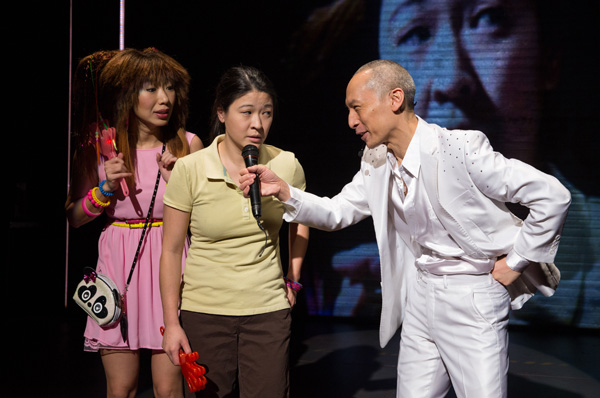The World of Extreme Happiness

(© Matthew Murphy)
The first thing we see in Frances Ya-Chu Cowhig's The World of Extreme Happiness is a Chinese peasant woman giving birth while standing up. "Get out of me you son of a turtle," she screams — but she doesn't give birth to a son. Without hesitation, the midwife leaves the baby girl to die in a bucket of pig slop. It's a shocking moment, but is it a fair depiction of life in rural China? It is an undeniable fact that a toxic mix of China's one-child policy and a society that values men over women has led to an uptick in female infanticide and gender-selective abortions. According to The Economist, 123 boys are born in China for every 100 girls. Still, Cowhig's opening moment feels sensational, leading the audience to wonder if the author is embellishing for dramatic effect.
That speculation persists throughout this 90-minute play, which is now making its world premiere with Manhattan Theatre Club at New York City Center Stage I. It's smart, entertaining, and provocative, but something doesn't feel quite right; we're never able to shake the feeling that the author is telling a tall tale.
Sunny (Jennifer Lim) is the aforementioned baby girl. She survives the slop bucket and grows up to become a janitor at Jade River Manufacturing, a massive factory in Shenzhen that supplies retail giant Price-Smart (read: Walmart). She sends her earnings home to support the education of her brother Pete (Telly Leung). Her father Li Han (James Saito) thinks Pete should drop out and join him in the coal mine, but Sunny won't hear of it. Her entire life is about Pete's success. That is, until her friend Ming-Ming (Jo Mei) drags her to a pep rally with motivational speaker Dr. Destiny (Francis Jue) and Sunny begins to see how she could take her life into her own hands. If she plays her cards right, she could even end up like Artemis Chang (Sue Jin Song, who strides across the stage like she owns it), the powerful and glamorous vice president of Price-Smart China. Sunny sees her opportunity to rocket to success at a PR event for the factory to be held at the Great Hall of the People in Beijing.
Under the caffeinated direction of Eric Ting, Extreme Happiness offers a vision of a rapidly changing country full of upwardly mobile youths ready to grab their share of the pie. Lim gives a compelling performance as Sunny, making us love her even when her character is not so nice. Leung's Pete is handsome and likable. As their father, Saito oscillates between being frighteningly mean and completely pathetic. They're just one family, but they come to represent the larger generational conflicts taking place across China today.
"Wealth! Power! Fame! Honor," Mr. Destiny chants with a crowd of thousands (created with spine-tingling intensity by sound designer Mikhail Fiksel). He encourages them to cast off the depressing past of their ancestors and look toward a bright new future. As played by Jue, he's the manic Dale Carnegie of the Chinese Dream, which looks a lot like the American Dream of yesteryear in its disregard for silly obstacles like tradition, facts, and intellectual property rights.
"When you finish the course you get a framed diploma from any university you want," Ming-Ming beams about Mr. Destiny's self-help program. Hilariously, Jenny Mannis costumes her like a Harajuku girl with color-streaked hair and impossibly high heels. In addition to Ming-Ming, the chameleonlike Mei plays Sunny's mom and a government agent (though you'd never know unless you checked the program). That agent's scenes with Artemis Chang are among the play's most fascinating. One might assume that a Communist party official and a millionaire industrialist would be natural enemies, but their relationship seems to be a lot more complicated under the Chinese system of statist capitalism.
Sadly, that relationship isn't something that Cowhig spends much time exploring. Instead, we're treated to highly fantastical passages: A mother kidnaps her son to keep him from leading a labor strike; Sunny almost goes through with a "ghost marriage" to a dead man so her family can access his estate; a man talks about making soup out of the bones of his dead brother during the Great Famine. Ting deftly stages these moments, and the actors commit to them with sincerity. The overwhelmingly American audience is left to guess what is heightened for dramatic effect and what is deadly serious. With the exception of a few mentions of Price-Smart, we get very little sense of our complicity in this story of human exploitation.
Taking dramatic license to the point of the ridiculous is a time-honored stage tradition. Unfortunately, when performing about China for an American audience, you have to contend with a certain knowledge gap. A program note helps to fill that deficit, but it is not enough. It would be amazing to see The World of Extreme Happiness performed for a Chinese audience that has a better (but by no means perfect) sense of the line between fact and fiction, but one suspects that its overtly political content will make that an impossibility for decades to come. China may be the superpower of the future, but its government is still deeply insecure and sensitive to criticism.










